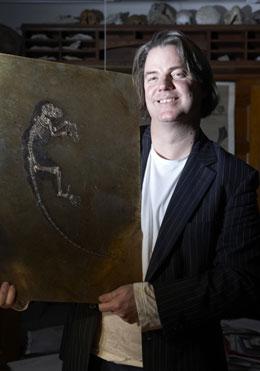Human laughter is rooted in the emotional displays of the common ancestor we share with apes, suggests an analysis of the vocalizations of tickled juvenile apes and humans. Continue reading Human-ape links heard in laughter
Category Archives: News
Taking a fossil primate on the road
 Jørn Hurum has accompanied the fossilized primate he nicknamed Ida on a world tour to fame and notoriety in the last week. The 47-million-year-old fossil is famous for its haunting completeness — the outlines of its fur and its last meal appear like a shadow around the intact skeleton. Yet Hurum has drawn fire for promoting the fossil and its potential links to human ancestors through a multi-platform media campaign alongside the release of a scientific paper that describes the fossil’s genealogy more modestly. Today, he and Ida paused in London to discuss the fallout of the publicity and the next scientific steps. Continue reading Taking a fossil primate on the road
Jørn Hurum has accompanied the fossilized primate he nicknamed Ida on a world tour to fame and notoriety in the last week. The 47-million-year-old fossil is famous for its haunting completeness — the outlines of its fur and its last meal appear like a shadow around the intact skeleton. Yet Hurum has drawn fire for promoting the fossil and its potential links to human ancestors through a multi-platform media campaign alongside the release of a scientific paper that describes the fossil’s genealogy more modestly. Today, he and Ida paused in London to discuss the fallout of the publicity and the next scientific steps. Continue reading Taking a fossil primate on the road
Reunion of fossil halves splits scientists
 Palaeontologists have identified a new species of primate by putting together two halves of an unusually complete fossil, which were separated for decades by the vagaries of the fossil trade. One half of the fossil — which some media reports have been quick to label ‘the missing link’ — was even doctored by a past owner to make it look more impressive.
Palaeontologists have identified a new species of primate by putting together two halves of an unusually complete fossil, which were separated for decades by the vagaries of the fossil trade. One half of the fossil — which some media reports have been quick to label ‘the missing link’ — was even doctored by a past owner to make it look more impressive.
The relationship of the new species, Darwinius masillae, to other early primates has sparked an academic controversy, a press conference earlier today at the American Museum of Natural History and a television documentary to air next week. Continue reading Reunion of fossil halves splits scientists
Thoughts of money soothe social rejection
 Handling or even contemplating money can relieve both physical pain and the distress of social rejection, according to a study by Chinese and American psychologists. But remembering cash one has spent intensifies both types of hurt.
Handling or even contemplating money can relieve both physical pain and the distress of social rejection, according to a study by Chinese and American psychologists. But remembering cash one has spent intensifies both types of hurt.
The findings suggest that the mere thought of having money makes people feel physically stronger and less dependent on the approval of others to satisfy their needs. “Money activates a general sense of confidence, strength, and efficacy,” the researchers propose.
Read the rest of this news story on Nature News: [html][pdf].
Also summarized by a Mexican outlet, called Reporte Indigo here: [html]